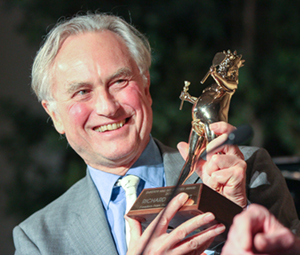 FFRF condemns one of the nation’s most well-known community radio stations for cancelling a talk by legendary scientist and freethinker Richard Dawkins.
FFRF condemns one of the nation’s most well-known community radio stations for cancelling a talk by legendary scientist and freethinker Richard Dawkins.
Dawkins was scheduled to give a talk and a book presentation on Aug. 9 sponsored by KPFA in Berkeley, Calif. Then, the station abruptly changed course. According to its explanatory statement, KPFA “booked this event based entirely on his excellent new book on science when we didn’t know he had offended and hurt — in his tweets and other comments on Islam, so many people. KPFA does not endorse hurtful speech. While KPFA emphatically supports serious free speech, we do not support abusive speech.”
There is a significant difference between criticizing Islam and casting aspersions on all Muslims. Our media — including community radio — should embrace and promote that distinction, not blur the lines between ideas and people.
The true test of an idea or belief is not how sincerely it is believed, but the facts upon which it rests. Ideas are not immune from criticism simply because some people believe in them truly and deeply. Beliefs matter far less than the evidence for those beliefs.
People deserve protection, ideas do not. This maxim, which should be a guiding principle for every nation and society that wishes to flourish, is being turned on its head. Congress, with its misguided Religious Freedom Restoration Act, and the Supreme Court, with its Hobby Lobby decision, have exacerbated the problem.
As Dawkins pointed out in his response to KPFA, “I am known as a frequent critic of Christianity and have never been deplatformed for that. Why do you give Islam a free pass? Why is it fine to criticize Christianity but not Islam?”
Tied up in this is this disinvitation is a fear of appearing racist or worse, being labeled a racist. But race and religion are very different, one being an unalterable characteristic of birth while the other, though often an accident of birth, can be altered simply by changing one’s mind. And that makes open, honest, and incisive criticism all the more important. Especially when, as the Nobel Prize-winning physicist Steven Weinberg observed of religion, “With or without it you would have good people doing good things and evil people doing evil things. But for good people to do evil things, that takes religion.”
No idea is above criticism, certainly not an idea as bad as religion.
Every year, FFRF co-presidents and attorneys speak at hundreds of events around the country, discussing the First Amendment and often criticizing religion and its tendency toward theocracy. We could easily be next. Indeed, we’ve felt the sting of being banned in the past from venues and billboards. KPFA broke no law when it deplatformed Dawkins, but kowtowing to a pious heckler’s veto is no less stunning or craven.
A prominent media institution should practice unfettered discourse instead of silencing controversial voices.
